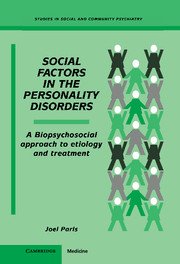Book contents
- Frontmatter
- Contents
- Foreword
- Introduction
- Acknowledgments
- 1 Overview
- 2 Personality Traits and Personality Disorders
- 3 Biological Factors
- 4 Psychological Factors
- 5 Social Factors – Methods
- 6 Social Factors – Mechanisms
- 7 A Biopsychosocial Model of the Personality Disorders
- 8 The Odd Cluster
- 9 The Impulsive Cluster
- 10 The Anxious Cluster
- 11 Treatment
- 12 Clinical Practice
- Epilogue: Summary and Research Implications
- References
- Index
Introduction
Published online by Cambridge University Press: 05 May 2010
- Frontmatter
- Contents
- Foreword
- Introduction
- Acknowledgments
- 1 Overview
- 2 Personality Traits and Personality Disorders
- 3 Biological Factors
- 4 Psychological Factors
- 5 Social Factors – Methods
- 6 Social Factors – Mechanisms
- 7 A Biopsychosocial Model of the Personality Disorders
- 8 The Odd Cluster
- 9 The Impulsive Cluster
- 10 The Anxious Cluster
- 11 Treatment
- 12 Clinical Practice
- Epilogue: Summary and Research Implications
- References
- Index
Summary
What is a personality disorder?
Mental disorders produce a wide range of distressing symptoms. Patients may suffer from the profound gloom of depression, the terror of a panic attack, or the disturbing unreality of psychosis. By and large, psychiatric symptoms are experienced as alien and painful.
Personality disorders, in contrast, may or may not cause subjective distress. Their core features are maladaptive patterns of behavior. Some patients report painful inner experiences, but others may not even agree that they have pathology. Some behaviors lead to consequences that make individuals unhappy, while other behaviors, at least in the short run, are more likely to make other people unhappy.
In essence, personality disorders are characterized by inflexible, pervasive, and stable behaviors that cause significant dysfunction in the life of the patient. They begin early in life and are enduring. We can illustrate these basic attributes with two clinical vignettes, describing one patient with distress, and one with almost no distress.
Case 1
A 23-year-old woman was undergoing training for a professional career. In spite of her external success, she thought about suicide nearly every day. In her personal life, she had many unsuccessful love affairs, in which she became overly attached to men who showed insufficient interest in her. When these relationships ended, she would become despondent.
Her problems had begun early in life. At age 13, she had attempted suicide with an overdose of pills. By the time she was 18, she had experimented with a variety of drugs, and was sexually promiscuous.
- Type
- Chapter
- Information
- Social Factors in the Personality DisordersA Biopsychosocial Approach to Etiology and Treatment, pp. xi - xxPublisher: Cambridge University PressPrint publication year: 1996

